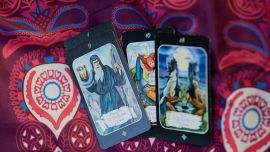Snowy hills without skiers, closed hotels, empty shops. At the foot of the Andes mountain range, the city of Bariloche is covered in snow but there will be no avalanche of tourists this winter amid the Covid-19 pandemic.
"Today we are closed, with zero activity," Belén García Bertone told AFP.
The 36-year-old is a third generation of hoteliers and president of the Chamber of Tourism of Bariloche.
Located within the Nahuel Huapi National Park, set mamong mountains and lakes, 1,800 km southwest of Buenos Aires, San Carlos de Bariloche is Argentina's fourth-most visited tourist destination by foreigners. Brazilians and Uruguayans rank it as their second preference behind Buenos Aires, according to tour operators.
When 2020 began and the coronavirus seemed an alien concept, Bariloche was planing for a big July, hoping to improve upon its strong performance in last year's high season. In July 2019, it received 112,000 tourists –– 15,000 of whom arrived on 51 direct flights from Brazil –– and hotel capacity, some 30,000 beds, was almost full, according to the mayor's office.
"The city is so beautiful. We have a significant snowfall and the snow season has begun but it is a city without tourists. You pass by places such as the civic centre, the Cerro Catedral or the Llao Llao [hotel] and they are empty," said José Lepio, a 46-year-old restaurant owner on the Cerro Catedral.
Twenty kilometres from the centre of Bariloche, Cerro Catedral, offers 120 kilometres of ski slopes spread over 600 hectares. At this time of year, preparations are usually feverish. Today only large tracts of snow can be seen.
"We have had a ski school here for 22 years and today we are here for the first time without tourists. We have had everything: ash from volcanoes, swine flu, hantavirus, but this is unthinkable," laments Néstor López Dávalos, president of the Cerro Catedral Business Association.
According to López Dávalos, the site takes between 7,000 and 8,000 daily visitors to break even "Without tourists, we don't really know what we are going to do. Many people are going to be out of a job," he warned.
In Bariloche, a city with 140,000 inhabitants, tourism employs around 15,000 people directly and generates another 34,000 jobs indirectly, according to the Tourism Chamber. They estimate the losses this month –– July, usually the best time of the year –– will be 3.6 billion pesos (about US$48 million). They estimate that three billion pesos (US$40 million) have already been lost from the April-June period, low season.
According to García Bertone, who quotes memories passed down by his father, also a hotelier, one must go back to 1978, when Argentina and Chile were about to go to war over to a border conflict and Bariloche had a third of its current population, to find the region so empty of tourists.
More recently, in 2011, the airport was closed for several months due to the ash cloud left by an eruption from the Puyehue volcano, some 90 kilometres away. An outbreak of hantavirus that left 11 dead in a nearby town drove away visitors in 2018.
In 2009, a virus outbreak caused the temporary suspension of student tourism, another key market of the Bariloche economy. Each year, the Andean city welcomes between 80,000 and 100,000 students for nightclubbing and recreational trips to celebrate the end of high school.
The town also offers adventure sports and was declared the national capital of chocolate in Argentina. Less touristy but also characteristic is the Bariloche Atomic Centre, the cradle of Argentine nuclear engineering.
The mandatory confinement decreed by the government on March 20 had already lowered expectations for the year. Borders were closed and commercial flights and long-distance coach trips were suspended. About 8,000 tourists had to be evacuated and repatriated back to their own countries. Some stayed initially, but after a hundred days, there are no more tourists in town.
"We are ready to re-open, with businesses already ready to start the season. It is an uncertain future. We do not know what protocol we will follow when tourism begins ... or if it will restart," warns Lepio.
On Bariloche's tourism website there's a simple slogan: "Winter is back! And we will see each other again soon!" Tourists are offered a "virtual visit" with photographs that highlight the beautiful Andean landscapes that encircle Bariloche. For now though, all they can do is look.
-TIMES/AFP
by Carlos Antilef & Liliana Samuel, AFP



















Comments